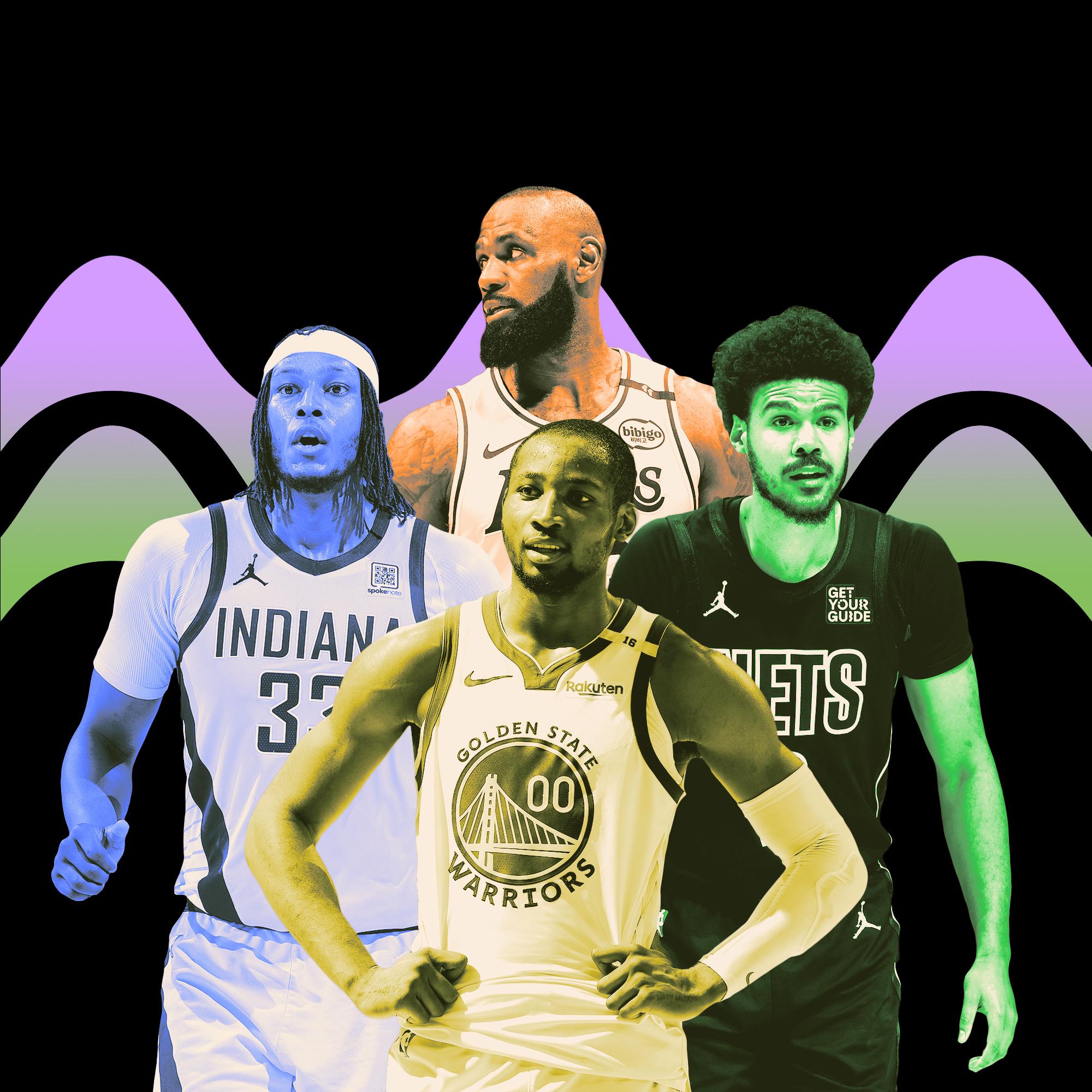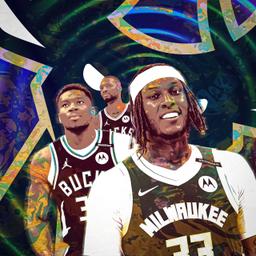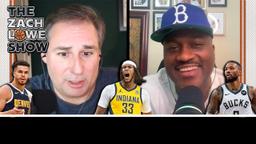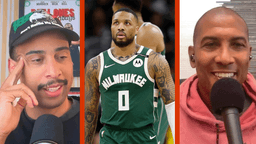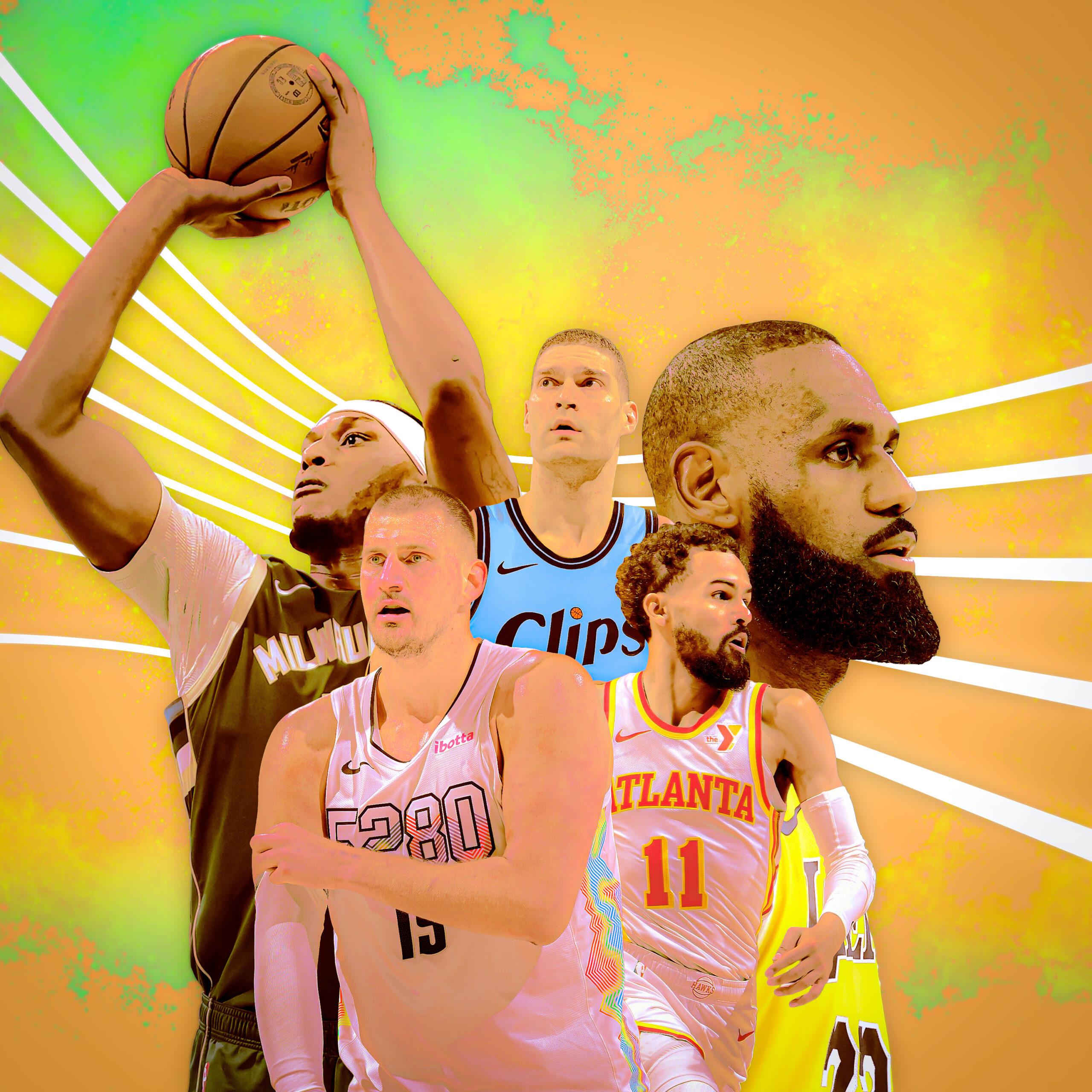
We’re now a few days into NBA free agency, and even though several specks of dust are still wafting through the air, enough of it has fallen to grade out a whole bunch of winners and losers. Let’s break down the most meaningful moves so far.
Winner: Atlanta Hawks
This feels like the biggest story in the league. In less than two weeks, Atlanta’s new front office has established itself as one of the more competent, opportunistic, and shrewd brain trusts in the NBA. Here’s a quick recap of what they’ve done since the Finals ended:
In: Kristaps Porzingis, Nickeil Alexander-Walker, Luke Kennard, Asa Newell, the more favorable unprotected 2026 first-round pick from New Orleans or Milwaukee, and a future second-round pick.
Out: Terance Mann, Georges Niang, a draft pick that became Derik Queen, a draft pick that became Drake Powell, and a future second-round pick. (Caris LeVert and Clint Capela both left in free agency.)
In other words, they added a 7-foot-3 deadeye outside shooting rim protector on an expiring contract, what could possibly be the no. 1 pick in a franchise-altering 2026 draft class, the top two-way guard available in free agency, and someone who’s twice led the NBA in 3-point percentage while making 43.3 percent of his attempts last season. What did they give up to get all that stuff? Pretty much nothing of value.
When you consider how creative, aggressive, and responsible the Hawks were in getting these deals done, no other team in the Eastern Conference will have a better offseason than them. Atlanta upgraded its present, splashed sunshine on its future, and—should the opportunity ever present itself—positioned itself as a front-running candidate to trade for Giannis Antetokounmpo. The Hawks don’t have to make any blockbuster moves, though, which is exactly where every ascending, talented, and asset-rich club strives to be.
As of this writing, they’re still $7.5 million under the tax and can credibly call themselves a contender, with plenty of outside shooting, athleticism, two-way versatility, size, and internal upside. Kennard, Porzingis, and NAW are all knockdown 3-point threats who will make life easier for Trae Young, Jalen Johnson, and Dyson Daniels. Any growth from Zaccharie Risacher in his sophomore season will feel like gravy. Onyeka Okongwu will either be the opening night starting center or return to life as the best backup big in the league, sharing the court with Porzingis in ginormous lineups that can space the floor much better than any group that big should.
Their summer isn’t over, obviously. Young is extension eligible and it’ll be interesting to see how those negotiations go. But, with leverage on its side, Atlanta should not feel any pressure to give him the max. And based on everything we’ve just seen, there’s good reason to believe that whatever decision they make will be a judicious one. It’s been a fantastic week for the Hawks, but the more meaningful takeaway here is that everything about their momentum feels sustainable. A sleeping giant is starting to stir.
Loser: Minnesota Timberwolves
Sometimes inertia is a death sentence. Sometimes it’s OK to stand pat and bet on chemistry’s immeasurable benefits. And sometimes you make the most of a tricky situation and forge ahead, hoping your infrastructure is solid enough to carry you through some stormy weather.
One year after they made a seismic trade with the New York Knicks and a few weeks after they were rumored to be in the hunt for Kevin Durant, Minnesota currently sits in that last bucket. It’s not a “loser” per se. We’re talking about a very good team that just re-signed Naz Reid and Julius Randle to long-term contracts. It’s at once a bet on continuity and the belief that Rob Dillingham and Terrence Shannon Jr. (who outscored Shai Gilgeous-Alexander in a playoff game!) will assume larger roles on a team that just waved goodbye to Alexander-Walker and knows Mike Conley Jr. will be 38 years old on opening night—and made only 45 percent of his layups last season.
Maybe it works out, Anthony Edwards takes another leap, Randle and Reid look more comfortable and confident with a combined $225 million heading into their bank accounts, Jaden McDaniels becomes more consistent and is able to harness his physical gifts with a bit more control, and Chris Finch shows why he’s one of the league’s best coaches by pushing every right button and maximizing this team’s immense talent.
There’s real downside, though, in a conference that’s chock-full of hopeful championship contenders. Games are not played on paper, but since paper is all we have to look at right now, the Rockets, Nuggets, Clippers, Spurs, and Mavericks all made moves to get better. The Blazers, Grizzlies, and Pelicans will not be fun opponents. The Thunder just throttled Minnesota in the Western Conference finals and did not lose a single piece from their rotation. The Lakers and Warriors still exist.
That’s the reality Minnesota is looking at. The semi-good news is they still have the $5.6 million taxpayer mid-level exception, but are also just under $5 million below the second apron. In familiarity they trust.
Winner: Orlando Magic
Orlando didn’t need a table-setting backup point guard who can take care of the ball, organize offensive sets, and knock down open 3s after last month’s brilliant trade for Desmond Bane, but they didn’t not need someone who checks all those boxes, either. Landing Tyus Jones is a huge victory for the Magic. He already has chemistry with Bane from their time on the Grizzlies, and he can make life easier for Paolo Banchero, Franz Wagner, and Jalen Suggs, three core pieces who can make plays for others when need be, but will feel relief not having to do it at the start of every other possession.
Jones’s one-year, $7 million contract means Orlando will have to duck the tax by shedding salary elsewhere, which may sting enough to alter how I feel about the addition. But right now it looks great and makes a ton of sense for a team that’s built to win several playoff rounds.
Loser: Sacramento Kings
You know a trade is bad when it makes you check at least three sources before believing it’s actually real. This was Sacramento’s decision to trade Jonas Valanciunas for Dario Saric just so it could then give the full midlevel exception to Dennis Schröder. If this roster holds—please, Vivek Ranadivé, for the sake of my own personal entertainment, leave it alone—it’ll be in the running for the most comical defense in the league.
Winner: Los Angeles Clippers
Last year, the Clippers opened training camp with Mo Bamba as their backup center. By season’s end the position was split between Ben Simmons and Nicolas Batum—two players who are very much not centers. In a conference full of competitive teams that continue to beef up their frontcourts, one way or another this hole had to be addressed.
Thanks to one of the savviest front offices in the league, it was! Now, when Ivica Zubac steps off the floor, Brook Lopez will come on. Yes, giving a two-year, $18 million deal to a seven-footer who turned 37 in April is usually not advisable when they're a couple months removed from getting played off the court in a humbling playoff defeat, but Lopez has missed only nine games since the 2022-23 season and his game still unlocks so much for everyone around him. The 17-year veteran is as good as any center in the league at contesting shots at the rim without fouling. In an almost identical sample size, Milwaukee’s defensive rating over the past two seasons was better when Lopez played without Antetokounmpo compared to lineups that had Giannis but no Brook, per Databallr.
He also remains a formidable pick-and-pop partner who made 37.3 percent of his 3s on a pretty high volume last season, which is good news for a team that can stand to get downhill a little more than they do. Every offense wants to stay big without sacrificing their spacing. The Clippers can now do that.
The role reduction here matters, too. Lopez should be able to play alongside Zubac when Ty Lue identifies a matchup that makes sense to go big, but in what should primarily be a reserve role he could literally play half as many total minutes as he did last season. Wear and tear is less of a concern in Los Angeles, on a team that can also go small when it wants.
The Clippers are a bona fide contender that will duck the luxury tax without losing any important pieces from last year’s 50-win squad. James Harden was brought back on a fair two-year deal, and Batum returned on a cheap two-year deal as well. Directly and indirectly, Lopez will make life easier for both of them, along with just about everybody else.
Loser: Joe Dumars, Troy Weaver, and the New Orleans Pelicans
In the non-Phoenix Suns division, New Orleans is the most messed-up situation in the league. Dumars and Weaver have stepped in and completely mismanaged a team that didn’t have any margin for error, and have now placed untenable strain on head coach Willie Green, who simultaneously needs to develop young talent and win a lot of games in a merciless conference with a roster that doesn’t make any sense.
Thanks to the Pelicans’ new, self-immolating front office, nobody should be surprised if the hand Green was dealt leads to him getting fired before Christmas. If it weren’t for Dallas trading Luka Doncic, I would still be shocked by the degree of irresponsibility New Orleans showed in surrendering its unprotected 2026 first-round pick to move up 10 slots in last week’s draft. It reminds me of that time a head of lettuce outlasted Liz Truss’s tenure as prime minister of the United Kingdom. If a head of lettuce ran New Orleans’s front office, that team would be in a much better situation than the Pelicans are in right now.
Just think back to that trade they made with Indiana during the Finals. If the Pelicans simply waited for that series to be over before they did anything, Indy’s 2026 first-round pick—after a season that will be played without Tyrese Haliburton—would still be theirs.
Winner: Luke Kornet
As one of the most underrated players in the league and someone who warranted a massive raise, Kornet would be a winner for drawing a four-year, $41 million contract even if he didn’t also land in the perfect situation. But it just so happens: He did! Whether backing up Victor Wembanyama or sharing a frontcourt in jumbo-sized lineups that blot out the sun, the San Antonio Spurs are a perfect place for Kornet to spend the next few years of his career.
With De’Aaron Fox, Stephon Castle, Dylan Harper, and Devin Vassell, there are several pick-and-roll ball handlers and dribble handoff partners for him to team up with as well. (Chris Paul remains unsigned and may no longer have a place in San Antonio’s plans, but add him to that list if he re-ups sometime over the next few days).
Kornet finished third in estimated plus-minus on a loaded Celtics team last season. He impacts winning in myriad ways, whether it’s elite rim protection, highly efficient finishing, or general self-awareness and understanding of his role—the strengths and limitations he brings to the table. Kornet is smart, doesn’t turn the ball over, catches lobs, and is always in the right place positionally on defense.
When Wembanyama wasn’t on the court last season, the Spurs were one of the worst rebounding teams in the league. Kornet will really help there. He’ll also help protect the paint, which is another area where San Antonio unsurprisingly struggled sans Wemby. According to Sportradar, only three players who defended at least 300 layups allowed a lower field goal percentage around the basket than Kornet last season: Chet Holmgren, Isaiah Stewart, and Wembanyama. This move is mutually beneficial on a number of levels.
Winner: Every New Member of the Denver Nuggets
Congratulations, you get to play basketball with Nikola Jokic! Get ready for the most delightful season of your career!
The Nuggets are having an incredible offseason. They’re a couple months removed from being a severely strained hamstring away from potentially winning their second championship in three years. Now, they’ve essentially swapped out Michael Porter Jr., DeAndre Jordan, Russell Westbrook, and Dario Saric for Tim Hardaway Jr., Cam Johnson, Jonas Valanciunas, and Bruce Brown Jr. For those keeping track at home, that’s four dependable rotation players with helpful skills that complement the world’s best player coming in for one of the more detrimental contracts in the league, a volatile game of Russian roulette at point guard, and two veterans who were not functionally in Denver’s rotation last season.
It’s way too soon to pop any champagne bottles, but the Nuggets have to feel extremely good about how things are going for them as they do everything they can to maximize Jokic’s prime. The Ben Tenzer–Jon Wallace era feels like it’ll be run with safe hands.
Winner: Detroit Pistons
Detroit’s offseason got off to a rough start. Stifling some momentum from an impressive campaign that ended in a competitive six-game series, the Pistons said goodbye to Hardaway and Schröder, while their second-leading scorer, Malik Beasley, found himself under investigation in a federal gambling probe. Not ideal.
They’ve bounced back fairly well, though, continuing on the theme of adding veterans on short-term deals who can alleviate some of Cade Cunningham’s on-ball burden while simultaneously accentuating the passing ability that makes him so great. Caris LeVert’s two-year, $29 million contract is a solid example.
Despite a tendency to record-scratch possessions and overdribble a bit, the 30-year-old was a sneaky Sixth Man of the Year candidate in Cleveland before he was traded to Atlanta last season. In both spots, LeVert’s true shooting percentage sat above league average. He’s a solid second-side pick-and-roll playmaker who offers more independent off-the-bounce scoring pop than anyone Detroit had in its second unit last season.
By acquiring Duncan Robinson from the Miami Heat in a sign-and-trade involving Simon Fontecchio, who brings one of the all-time great 3-point celebrations (🤌🤌🤌) down to South Beach, Detroit’s spacing won’t take a hit. Robinson can not only replace Beasley’s gravity and tough movement shooting, but should be able to team up with Jalen Duren to recreate the same dribble-handoff-heavy two-man game he once enjoyed with Bam Adebayo.
Robinson’s three-year, $48 million contract is partially guaranteed in the second year and non-guaranteed in year three. That’s a boon for Detroit’s long-term cap sheet, as potential extensions for Jaden Ivey and Duren kick in next season. As an aside: LeVert and Robinson were also college teammates for a year at Michigan, so these deals double as a homecoming and a reunion.
The Pistons had enough cap space to outbid the Hawks for Nickeil Alexander-Walker and were reportedly interested in Malik Monk, but this route, at the price tags they paid, is the better play. (Since it hasn’t been said yet, a healthy Ivey is a big upgrade over Schröder.)
Winner: Houston Rockets
I was extremely high on the Kevin Durant trade when it happened, I love Fred VanVleet’s new contract, and I think Jabari Smith Jr.’s extension may end up being the steal of his draft class. The addition of Dorian Finney-Smith and Clint Capela, though, gives Houston an embarrassment of riches. How did the Rockets construct this monstrous blend of experience, size, athleticism, and upside, while staying under the first apron? With all due respect to the Thunder, they may have the best defense in the league next season.
Losers: LeBron James and Luka Doncic
In the shadow of a momentous ownership change, not even six months after they pulled off the most ridiculous trade in NBA history, this team finds itself in such an unnecessarily strange situation, full of competing agendas and contradicting timelines beneath an incompetent front office that tends to embody the phrase “dumb luck.”
They just signed Deandre Ayton to a two-year, $16.6 million contract, which may solve their short-term question at center but is far more likely to land as a rickety bridge to whoever L.A.’s actual franchise center will be. Meanwhile, the Lakers have an overarching predicament with LeBron that doesn’t figure to be resolved anytime soon. Is he on the team in a few months? I wrote more in-depth about these issues a couple days ago in The Offer Sheet, but the longer this drama drags on, the less time they have to build a sensible roster around Doncic. That part isn’t a crisis (Doncic becomes extension-eligible on August 2, and no one should panic unless he opts not to commit when L.A. makes its offer), but progress can’t be realized until James is elsewhere. Until then, the Lakers aren’t a title contender. And not being a title contender with Luka and LeBron on your roster is, on its face, kind of hard to do.
Winner: The Proliferation of Double-Big Lineups
After Oklahoma City just won the NBA championship starting two 7-footers in a league that needs to fortify itself against Jokic and prepare for the scorched-Earth scenarios soon wrought by Wembanyama, more and more clubs are committing to double-big lineups. Some, like the Thunder and Cavaliers, have already enjoyed incredible success with them in their starting lineup. Here are a few new ones, plus some returning combinations that we should see next season (extra points for the teams with three bigs):
Cavaliers: Evan Mobley-Jarrett Allen
Thunder: Chet Holmgren-Isaiah Hartenstein
Grizzlies: Jaren Jackson Jr.-Zach Edey
Timberwolves: Rudy Gobert-Naz Reid
Rockets: Alperen Sengun-Steven Adams-Clint Capela
Mavericks: Anthony Davis-Daniel Gafford-Dereck Lively II
Knicks: Karl-Anthony Towns-Mitchell Robinson
Nuggets: Nikola Jokic-Jonas Valanciunas
Clippers: Ivica Zubac-Brook Lopez
Spurs: Victor Wembanyama-Luke Kornet
Hawks: Onkeyka Okongwu-Kristaps Porzingis
Heat: Bam Adebayo-Kel’el Ware
Suns: Mark Williams-Khaman Maluach
That’s nearly half the league! Some of these tandems are obviously more compatible than others. We’ll see a few of them being strictly utilized in very specific situations. But the general trend speaks to an uptick in big men with ball skills, an ability to space the floor, and move around a bit more on defense. Versatility and 3-point shooting isn’t going anywhere, but the desire to physically overwhelm the paint, rebound, and intimidate drivers who test the paint is growing, too. Size really matters.
Loser: Heat Culture
I was bored last week and started to wonder if anyone would follow Luka’s steps this summer as a seemingly untouchable star who gets traded out of the blue after a team spent years grooming them into a beloved franchise icon.
Heat center Bam Adebayo was the best candidate I could think of. He obviously isn’t on Doncic’s level, but holds similar status with the squad that drafted him. Adebayo is a cultural torch-bearing defensive genius who infuses a degree of respectability into a Heat organization that’s spent the last couple years operating on the outer fringes of relevance.
In a vacuum, a trade would be rash. In reality, the Heat are in the wilderness, coming off a humbling playoff exit that showed just how far away from title contention they really are. Adebayo, meanwhile, turns 28 later this month and just signed a three-year, $165 million extension that doesn’t kick in until next season. He did not make last season’s All-Star team and broke a five-season streak appearing on an All-Defensive team. (Over that span, Bam also finished each season in the top five for Defensive Player of the Year. He’s so good.)
So where is Miami actually going post–Jimmy Butler? The timing of its dip couldn’t be worse, with no obvious path to adding the level of star that’s necessary to climb up in a down conference. Resisting the urge to offer anything substantive for Kevin Durant was understandable albeit a little sad. The Heat showed more self-awareness than self-will, which is admirable, but not enough on its own to lift them from the ditch they crashed into shortly after the 2023 Finals.
Maybe, somehow, they pull a rabbit out of a hat. Or … maybe not, in which case I can’t help but wonder what they could get for Adebayo, and why, as painful as it might be, moving on from such a foundational building block makes sense when what they’re able to construct on top of it can barely get out of the play-in tournament.
Winner: Oklahoma City Thunder
Loser: Oklahoma City Thunder
By definition, the Thunder are big winners. They just celebrated their first championship in franchise history with a new massive contract extension for Shai Gilgeous-Alexander. Life is good. But after a dominant 68-win regular season, Oklahoma City didn’t exactly stomp its way through the playoffs. The Nuggets and Rockets are on their heels. The Clippers and Spurs aren’t far behind. There’s a reason no team has been able to defend their title in seven years. The Thunder officially have their hands full.
Winner: Damian Lillard
Loser: Milwaukee Bucks
I wrote about Milwaukee’s historically desperate decision to waive-and-stretch Damian Lillard so it could replace Brook Lopez with a younger, more expensive version of the same player. I think it was foolish to retain the pieces from a mediocre roster that doesn’t really complement their best player very well at the cost of adding $22.5 million of dead money to their books for each of the next five years. That’s just me!
To be fair, Milwaukee still has some flexibility and can use a future first-round pick (along with up to four pick swaps) in a trade, should they want to make another swing and get, like, an actual point guard or wing who can dribble. They’re way under the tax and nowhere near the first apron, so that’s nice. But, as presently constructed, even in the Eastern Conference, they just aren’t close to winning three playoff rounds, let alone coming close to whichever juggernaut emerges from the West.
In that aforementioned piece, I didn’t really touch on Lillard’s perspective. As someone who never really clicked in Milwaukee, he can now collect massive paychecks with free reign to handpick his next team once he’s healthy enough to get back on the court.
Losers: Restricted Free Agents
This could easily end up changing as free agency rolls on, but with no cap-space-hoarding boogeymen out there to drive up anyone’s market price, restricted free agents find themselves in a pickle. The most notable unsigned players in this pool include Josh Giddey, Jonathan Kuminga, Cam Thomas, and Quentin Grimes. Deals of some kind will be struck, but until they happen, several questions will hover above these negotiations. How long, and for how much money, will each contract be for? In the case of Kuminga and Thomas, will any sign-and-trades go down? It’s a fascinating crop of talent: flawed, exciting, and hard to value.
Winner: New York Knicks
Coming off their deepest playoff run in a quarter century, with very little depth and core pieces that had to be overtaxed, the Knicks entered free agency needing to tinker around the margins without much flexibility. They responded by adding Jordan Clarkson and Guerson Yabusele, giving them a viable nine-man playoff rotation for new head coach Mike Brown (great hire!) to manage throughout the season. In an Eastern Conference that’s up for grabs, this is a pretty great outcome, even if they’re hard-capped at the second apron and currently only have $3.5 million to spend on three empty roster slots.

